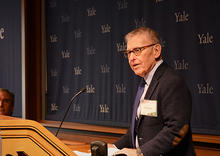Brazilian Studies in the United States: The Road Ahead

On May 7, the Council on Latin American & Iberian Studies at the MacMillan Center and the Ministry of Education of Brazil co-sponsored a conference titled, “Brazilian Studies in the United States: The Road Ahead.” The conference represents an ongoing partnership between Yale and the Brazilian Ministry of Education. Through this partnership, both institutions seek to foster scholarly connections as well as improve the study of Brazilian culture and the Portuguese language within the U.S. The May 7th event was the first of two conferences. The second one will take place on November 30-December 1, 2018, and will again be hosted at Yale.
“This preliminary meeting here at Yale will give us an opportunity to ask about the present and future of Brazilian studies in the U.S„” conference co-organizer Stuart Schwartz (with Professor Kenneth David Jackson, Yale University) said in his introductory remarks. Schwartz, George Burton Adams Professor of History, Yale University, and a leading scholar of Brazilian history, hoped that the conference would provide a space for U.S. and Brazilian scholars to discuss “the political, diplomatic, commercial, and intellectual relations between us, and what we can learn about and from each other.”
The event included four panels, bringing together scholars from various disciplines. The speakers represented Yale as well as a number of other U.S. colleges and universities. (View program and speaker list.) The audience included representatives from the Brazilian Ministry of Education and the Brazilian Consulate in Hartford; faculty members from Yale and other institutions; and graduate and professional students.
The first panel of the day focused on social sciences, arts, and the humanities. This panel brought together four professors from departments of History, Brazilian Studies, Spanish and Portuguese, and Anthropology. The speakers discussed aspects of their research and also offered comments on the state of Brazilian studies in the U.S. They also explored the sometimes-complicated relationships between U.S.-based Brazilianists and scholars from Brazil. In both the presentations and the question-and-answer session, the speakers considered questions of access and inclusivity for Brazilian studies. Several of the speakers mentioned that they sought to incorporate often-ignored populations like Afro-Brazilians and women into their work, which is one way to make Brazilian studies more inclusive and attract a wider array of students.
The second panel continued these discussions about social sciences, arts, and the humanities, bringing together specialists on history, literature, and ethnomusicology. Despite this broad range of topics, the presentations in this panel converged on two questions. First: What is the relationship between the past and the present in Brazil? And second: How can Brazil be made relevant to other parts of the world? As the speakers made clear, these questions are more than just scholarly concerns. Looking at the past might help us interpret the current political situation in Brazil and understand the particular challenges facing Brazilian academics today. Additionally, putting Brazil in a global context can open up Brazilian studies classrooms to a broader audience.
The third panel of the day moved away from the humanities to a discussion on public health, medicine, and the environment. Faculty members in the fields of epidemiology, medicine, and forestry discussed their work in Brazil. All five speakers are actively engaged with Brazilian institutions, communities, and private companies. As such, they were able to give valuable insights into both the benefits and challenges of transnational scholarly exchanges. The speakers emphasized the importance of collaboration, cooperation, community involvement, and mutual respect when conducting research in Brazil. After the formal presentations, the speakers considered the difficult question of English being used as a global scientific language, and the extent to which this provides a barrier to entry for certain sectors of the Brazilian population.
The conference fostered a lively discussion among scholars of various disciplinary backgrounds and nationalities, and the last session of it was a discussion and planning session that looked forward to the second conference in November. According Professor Jackson, these conferences are part of a much broader conversation that has been going on for decades. Jackson called this conference a “follow-up” to a similar conference that took place in 1999. “Now, about twenty years later, we get the change to reassess Brazilian studies,” he said. In the context of the twenty-first century, this conference is also part of a larger, ongoing conversation about the future of the humanities and of language study in the U.S. The decline of the humanities, Jackson said, is a “systemic situation throughout the country that should be addressed.” These conferences, which consider strategies for getting students interested in Brazil and in the Portuguese language, are ways to address this overarching challenge.
Written by Hannah Greenwald, PhD Student, CLAIS Graduate Student Network
